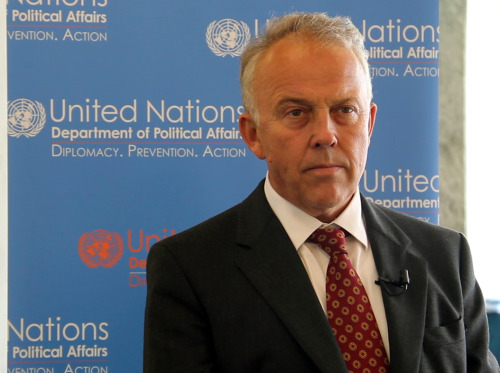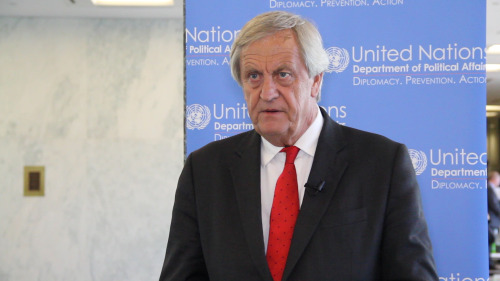Date: Wed, 28 Sep 2016 21:07:29 +0200
Supporting Somalia as It Emerges from Decades of Conflict

Special Representative for Somalia Michael Keating. UN Photo
Sepotember 28, 2016
The Foreign Ministers of Somalia, the United Kingdom, Ethiopia and Italy today led international partners reaffirming their support for Somalia as the country continues its transition from 25 years of war. At a meeting held on the sidelines of the high-level segment of the General Assembly, the officials – along with Deputy-Secretary-General Jan Eliasson, African Union Commissioner for Peace and Security Smail Chergui, and Special Representative of the Secretary-General for Somalia Michael Keating – outlined the difficulties still in the way of this transition but also highlighted the remarkable progress made in the country in recent years as it moves towards forging a federal and democratic state. In the run up to the meeting, we spoke to Special Representative Keating, head of the United Nations Mission in Somalia (UNSOM), about how far Somalia has come and where it is headed.
Politically Speaking: There has been much discussion about the elections set to take place in Somalia this year. What’s the latest? Are they going to happen?
Michael Keating: The thing to understand about the elections, as you call them, is that it’s really an electoral process. It is a political process, every detail of which has been negotiated politically with electoral features. And, in fact, there are elections going on in this building for a new Secretary-General, which is also a political process with electoral features. So, judging the elections in Somalia against criteria used for normal universal elections doesn’t really apply. So, these elections will take place. There may be a little bit of slippage on technical grounds, but it’s quite a complicated process to organize because there is no voter registry; institutions in Somalia after 25 years of civil war have been undermined or destroyed, they are being rebuilt now. But it’s a big step forward from 2012 when 135 men chose 275 MPs. This time we have electoral colleges of 14,000 people choosing 275 MPs, plus an Upper House which is being formed on a geographical basis. So it’s a big departure, even though, if you look at it globally, you can say 14,000 people, well that’s not a huge constituency. But in terms of Somalia’s political journey, it’s a very important, positive development.
Q: Are we still on track to realize “Vision 2016”, the roadmap for democratic transition in Somalia?
The big development in Somalia has been the emergence of a federal architecture. A few years ago, when 2016, Vision 2016 was articulated we didn’t have four federal member states. There may be a fifth formed, literally in the coming weeks if not the coming months, so we now have a much stronger basis upon which to move that vision forward.
Things have taken longer than many were hoping. For example, we were talking about the electoral process: One idea was to have universal elections by 2016, but it’s proved almost impossible to do that, as I say, because the institutional architecture that we take for granted in many countries around elections is not there, including national ID, voter registration, a fully functional court system. But we now have the elements for strengthening a federal state. I think the next step is a constitutional review to clarify many of the ambiguities in the constitution – the relationship between the Prime Minister and the President is unclear, the relationship between the Federal Government and the federal member states is unclear, resource and revenue sharing needs to be sorted out and in every domain, whether it’s agriculture, education, energy, what are the respective responsibilities of the central government and the federal member states - needs to be addressed. That’s the big challenge going forward.
Q: What is the key qualitative difference that the international community and UNSOM specifically is contributing to bring peace to Somalia?
I think the main thing we are doing is facilitating discussions among Somalis about what kind of country they want, what kind of future they want, what kind of political system they want. They have to decide these things. We can bring global experience to bear; we can bring technical skills to bear; we can advise them and train them on standards, on norms, on best practice, on what works and what doesn’t work, when it comes to governance, when it comes to functionality of parliamentary institutions, when it comes to a security establishment that’s acceptable to the whole population. We can bring all that knowledge to bear. But I think the main thing we are doing is helping the Somalis convert conflict from violence into politics, but do so in a way that is informed by real knowledge that is relevant to their situation. And their situation is unique. 25 years of civil war, a clan-based society, so it’s not an easy one, this, but I think that’s our main contribution.
Special Envoy for Sudan and South Sudan: Return to a Troubled Region

Nicholas Haysom, UN Special Envoy for Sudan and South Sudan. UN Photo
Sepotember 28, 2016
One highly anticipated parallel event of the high-level week of the General Assembly this year was the meeting held today to support and consolidate peace in South Sudan. Before taking part in that event, Nicholas Haysom, the Secretary-General’s Special Envoy for Sudan and South Sudan, spoke to us about his new role - he only recently took up his post after being appointed in March - and how his previous experience, including in the region, has equipped him to help the two countries make and build peace.
Politically Speaking: You are relatively new to this position, but not new to the region, where you have served before. Given that experience, how are you approaching this new role?
Well, I was quite struck by how many of the old personalities still wield quite significant influence today. It has been very easy for me to re-engage with many of them. But the issues have changed quite distinctly from a North-South conflict to one in which both Sudan and South Sudan are grappling to find a way of building an inclusive social contract which keeps all the players, stakeholders and potentially destructive forces inside their respective tents.
The second issue which has struck me or perspective coming back is really how troubled the region, the broader region is and how as a region it stands out from almost any other place in the world for the range and extent of violent conflicts, which take place both within the Sudans, between the Sudans and in between the member states of Intergovernmental Authority for Development (IGAD). So, there’s a broader task, which has to be confronted, which is the need to have the region take real responsibility for creating stability and prosperity in the region.
Q: The situation in South Sudan is especially frustrating for the international community given the role it played in bringing that state into being. How are you approaching your task? Where do you see the situation going?
Well, I think my rather specialized mandate which really comes out of the conflict between the north and the south at the time of secession has made me really aware of the incapacity of those two from forging a productive, collaborative relationship unless they can deal with their internal conflicts. And I think as the international community has really thrown itself into the task of trying to provide a regional protection force, particularly in Juba, to create the political space to forge a peace agreement, it seems to me that no one has taken a step back and looked at the political roadmap which the South, and of course in a different context the North, has to follow to create the conditions for a sustainable peace. And those are the primarily political measures and I would notably sort of single out that in addition to the state building imperative, with which most people have viewed South Sudan, there really is a much more important nation-building imperative. This is a country where the subnational identities overwhelm a sense of national identity, of a common destiny shared by all the people in South Sudan. I think if you ask them: Who are you? A South Sudan citizen would define himself by ethnic or tribal identity rather than his national identity.
Q: You are here for the General Assembly (GA) during the high-level segment. What do you expect to achieve?
I think our focus here is a much narrower one. It’s not to speak to the international community as such, but it’s to use the opportunity of the GA week to pull in all the regional leaders, the continents political leadership and those international leaders who are directly engaged in the South Sudan situation and trying to have them agree on a common agenda going forward; to have them speak to the political imperatives which have to be addressed and not just the question of how to get the regional protection force into Juba. And I think if we can have that notably as an outcome of the [23 September] meeting, then that’ll be a take-away. Now, bringing people onto the same page is not something which takes place at a simple event in the margins of the GA, it’s the interaction, intensive interaction between all those stakeholders over the course of this week. And it’s going to generate a successful outcome from that meeting.